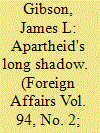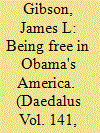| Srl | Item |
| 1 |
ID:
137570


|
|
|
|
|
| Summary/Abstract |
Last April, South Africa celebrated the 20th anniversary of its first democratic elections, which brought to power the African National Congress (ANC) and its leader, Nelson Mandela, who had led the antiapartheid movement for decades. Many had long believed that civil war was the only way that the apartheid state would fall, and South Africa’s mostly peaceful transition from a racist authoritarian state to a multiracial democracy stands as one of the most surprising political developments of the twentieth century. The shift has not been without its problems, but few would contest South Africa’s credentials as a democracy—perhaps the most democratic state in Africa.
|
|
|
|
|
|
|
|
|
|
|
|
|
|
|
|
| 2 |
ID:
121028


|
|
|
|
|
| Publication |
2012.
|
| Summary/Abstract |
Many studies of interracial differences in rates of political participation pay too little attention to African Americans' perceptions of whether they can freely participate in politics. Survey evidence collected over the last several decades has consistently shown that black Americans perceive much less political freedom available to them than do white Americans. The gap in perceived freedom has narrowed somewhat in recent years but remains large. Following the empowerment hypothesis of Lawrence Bobo and Franklin Gilliam, black perceptions of freedom increased with the election of Barack Obama to the American presidency. But perhaps unexpectedly, the empowerment bonus has not persisted, especially among conservative and fundamentalist blacks. Because African Americans do not perceive that their government would permit various types of political action, it is likely that substantial interracial differences exist in non-voting types of political participation, especially political action directed against governmental authority.
|
|
|
|
|
|
|
|
|
|
|
|
|
|
|
|
| 3 |
ID:
069652


|
|
|